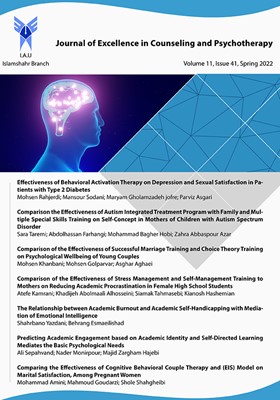Comparison of the Effectiveness of Stress Management and Self-Management Training to Mothers on Reducing Academic Procrastination in Female High School Students
Subject Areas : Journal of Excellence in Counseling and PsychotherapyAtefe Kamrani 1 , Khadijeh Abolmaali Alhosseini 2 * , Siamak Tahmasebi 3 , Kianosh Hashemian 4
1 - PhD. Student, Department of Counseling and Psychology, Rodehen Branch , Islamic Azad University, Rodehen, Iran.
2 - Associate Professor, Department of Psychology, Rodehen Branch , Islamic Azad University, Rodehen, Iran.
3 - Assistant Professor, Department of Psychology, Rodehen Branch , Islamic Azad University, Rodehen, Iran.
4 - Associate Professor, Department of Psychology, Rodehen Branch , Islamic Azad University, Rodehen, Iran.
Keywords: stress management training, Academic Procrastination, self-management training,
Abstract :
Purpose: The aim of this study was to compare the effectiveness of stress management training and self-management to mothers on reducing their children's academic procrastination. Methodology: This was a quasi-experimental study with a pretest-posttest design and one-month follow-up with a control group. The statistical population included female high school students in District 5 of Tehran and their mothers in the academic year 2918-2019. The statistical sample of this study was 48 students along with their mothers who were selected by convenience sampling. Then their mothers were randomly replaced in four groups (three experimental groups and one control group). The stress management and self-management training program and integrated training (stress management and self-management) in 8 sessions of 60 minutes, twice a week. The research instruments included academic procrastination questionnaire (Savari, 2011), data were analyzed using repeated measures analysis of variance test and Benferoni post hoc test using SPSS software version 23. Findings: Combined training has been a more effective method in reducing procrastination scores compared to the other three methods. The results show that in contrast to the two components of deliberate procrastination and procrastination due to fatigue, the difference between the adjusted means of procrastination component due to unplanned and total procrastination score in the two management groups and the group Control (p=0.001) is significant. And this issue shows the significant effectiveness of self-management training method in reducing procrastination due to unplanned and the total score of procrastination. Also, the effect of all three educational methods on mothers in the follow-up phase reduced the academic procrastination of their daughters and there is no significant difference in the effectiveness of these three methods in reducing academic procrastination. Conclusion: Integrated stress management training and self-management to mothers permanently reduces their children's academic procrastination. Implementing a combination of stress management and self-management training program for mothers has reduced their children's academic procrastination compared to the control group. Based on this, it is concluded that the combined training of stress management and self-management to mothers, continuously reduces the dimensions of procrastination of children.
_||_

